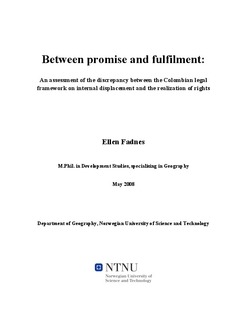| dc.description.abstract | This dissertation addresses the discrepancy between the Colombian national legislation for Internally Displaced Persons (IDPs) and the actual realization of rights. Colombia possesses one of the world’s most advanced IDP laws, covering all stages of displacement, and the authorities have developed a complex set of institutions responsible to enforce the law. However, the implementation of the legislation has proven highly complicated. The Colombian government has been able to achieve important improvements in providing emergency humanitarian assistance to the IDP population, but significantly less in terms of prevention, resettlement and return. This thesis argues that the challenge of internal displacement in Colombia is perceived by the IDP regime as a technical rather than a political problem, which detaches the displacement from its structural and underlying causes and complicates prevention and resettlement.
The causes of the failure of complying with the IDP law are highly complex and must be analysed in relation to political, historical and cultural structures in the Colombian society. The ownership of territory is vital in terms of power and extensive income generating activities, which imply strong interests in access to land, and complicating the prevention of displacement and protection of abandoned land. The relationship between the land owning elite and policy-makers on the one hand and the poor, rural and displaced population on the other hand is characterized by mutual distrust due to historical patterns of oppression and exploitation. The political structures are analysed in light of the current government’s discourse on the political situation, which argues that there is no longer a conflict going on in Colombia, but rather isolated terrorist acts. The government claims to have achieved a complete demobilization of the right-wing paramilitary groups, in spite of continued denouncements from displaced persons demonstrating the existence of these groups. In light of James Ferguson’s thesis of how a development intervention is depoliticized by focusing on technical solutions, is it here argued that the underlying political causes of internal displacement in Colombia are largely overlooked because of the focus on concrete and measurable solutions.
Liisa Malkki’s theoretical concepts of depoliticizing and dehistoricizing are applied to show how the emphasis on humanitarian assistance portrays the displaced population as a ‘universalized mass of victims’ unable to voice their claims. This further contributes to illustrate how displacement becomes detached from its political and historical context, and hence renders it impossible to grasp the underlying causes of displacement. Anthony Giddens’ theory of structuration contributes to explain how these structures limit the possibilities for manoeuvrability, but simultaneously how the same structures may enable a level of power and choice. The actors are furthermore perceived to be capable of influencing the structures, as it is the actors themselves how have defined these structures. Through legal mechanisms ensured by the 1991constitutional reform and increased organization within the displaced population, the IDPs have improved their possibility to voice their claims and create spaces for communicating with the authorities. This thesis argues that small improvements are made because of an increased space for agency among the displaced population, but that the implementation of crucial sections of the IDP law are still highly complicated because of the emphasis on technical measures which removes the focus away from the underlying political causes of displacement. | nb_NO |
